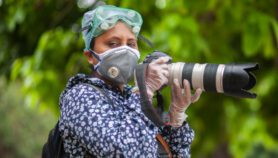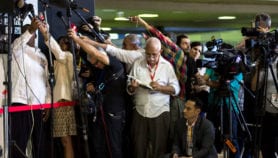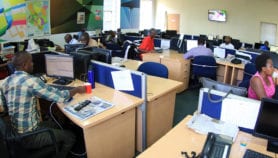By: Nadia El-Awady
Send to a friend
The details you provide on this page will not be used to send unsolicited email, and will not be sold to a 3rd party. See privacy policy.
Egypt has a long history of science communication but journalists today struggle to get the resources they need, says Nadia El-Awady.
The status of science journalism in a country often reflects the value that its society, and particularly its political leaders, attach to science itself. On average, Arab states spend just 0.06 per cent of their gross domestic product on research and development, compared to between two and three per cent in most Western countries — so perhaps it is not surprising that science journalism in the Arab world is at a low ebb.
Yet its scientists and scientific journalists alike have high ambitions, and feel that they have much to give. Despite minimal resources for funding their ambitions, many members of each group already recognise the need to join forces to discuss how to pull the region out of its current scientific decline.
There is certainly evidence that Arab readers and viewers are interested in science. A case in point is IslamOnline.Net, a joint Qatari-Egyptian venture launched in 1999. The website’s science pages receive an average of 300,000 page views each month — more than its political, economical, cultural and social pages.
You need trained people to cope with this kind of demand, and the supply of adequate information technology training is, in fact, one of the biggest challenges now facing Egypt and other countries in the Muslim world. Another is to provide these individuals with the resources and opportunities they will need to use their skills effectively, and ultimately for the benefit of their communities and countries.
Distinguished past
The history of Egyptian science journalism — or at least of encouraging an appreciation of science outside the scientific community — began as early as 1798, during France’s colonial rule of the country. That year Napoleon Bonaparte published a magazine called La Decade Egyptienne.
Produced in collaboration with the Egyptian Scientific Academy, the magazine covered various aspects of social, economic and cultural life in Egypt. But it also made a point of featuring scientific issues in articles such as [1] ‘Observations sur l’aile de l’Autruche’ (‘Observations on the wing of the ostrich’), written by ‘le citoyen Geoffroy’. [2]
Almost 70 years later, the Egyptian government supervised the publication of the first medical magazine to be published in the East, Ya`soob At-tibb (The Medicine Dragonfly). In the same year, the first issue of The Egyptian Military Gazette was released, stating as one of its goals the simplification of the military arts and sciences. [3]
These efforts were followed by two more magazines carrying articles on science-related topics. The first, The Garden of Schools, was published in 1870 and covered the arts, society, astronomy and history as well as mathematics. The second, The Harvested, was first published in Lebanon in 1876, and in Cairo in 1878, where it became Egypt’s first industrial science magazine. It was published until 1952. [4]
Modern Egyptian science journalism began in the Al-Akhbar daily newspaper in 1951, when the newspaper set aside a special column for the sciences, ‘Science News’. Other newspapers followed suit — Al-Qahirah in 1953, Al-Masa’ in 1956, Asha`b newspaper in 1958 and Al-Ahram in 1964. [5] (Egyptian television has also broadcast scientific programmes since its establishment in 1960, but these remain irregular and short-lived.) [6]
Despite this early and promising start, little has changed on the science news front over the subsequent 50 years. Throughout the Egyptian media, science issues rarely surface — although short science pieces do appear on the front page of Al-Ahram, for example. Science columns in Egyptian daily newspapers are, for the most part, hidden on inside pages, and coverage of scientific issues on prime-time television remains rare.
Science editors and journalists in Egypt agree that the main reason for this is that media interests in the country remain unconvinced of the importance of science. [7] The result has been not only minimal space, but also minimal funding. Science journalists must work within very limited budgets; the result is coverage usually based on short news stories or ‘clips’, originating from material that is largely translated from Western sources.
Science programmes on television are presented unimaginatively and often have no local relevance; most are either based on interviews with specialist academics, or on a presenter describing scenes from documentaries that have been purchased from abroad. Shot inside studios with fixed cameras, the shows unsurprisingly fail to grab the attention of the Egyptian public. [6]
Science journalists report that although Egyptians would be interested in seeing coverage of local science issues, this can be a difficult job. Many of the country’s scientific institutions, for example, lack the technology to disseminate their findings widely. Extensive computer networks, for instance, remain a mere dream in many of Egypt’s poorly funded scientific institutions and universities. Egyptian universities and scientific institutions tend to have rudimentary websites, and do not publicise their activities through newsletters or press releases.
But journalists, too, suffer from a dearth of these resources, which are so vital to their work. Even the largest of Egypt’s newspapers and television channels lack the money to provide computers and Internet connections to their reporters and editors.
Another problem faced by those working in the field is a lack of academic training for science journalists. "Our universities give little or no importance at all to specialised forms of journalism," says Ismail Ibrahim, managing editor of Al-Ahram newspaper and professor of journalism and mass communications at Cairo University.
Ibrahim points out that faculties of journalism in Arab universities still teach curricula that were developed more than 50 years ago. "Most professors of mass communication focus on the theoretical aspects of journalism, rather than practical journalism," he says. Newly graduated journalists must learn practical skills — including those required for specialist coverage, such as science — on the job.
Some journalistic institutions have organised occasional workshops to improve the skills of their scientific journalists, in particular the newspapers Al-Ahram and Al-Akhbar. But few scientific journalists show up at these events. [7] They may not be nominated to attend them, or they may not know about them, may think them unimportant or simply lack the time to get to them.
Meanwhile, international organisations are hosting more and more workshops on particular topics. But most of these are limited to providing basic information — for example, on environmental issues — that will broaden Egyptian science journalists’ general knowledge. Few of these workshops, if any, are designed to train journalists in the skills they really need to communicate science to the general public.
Proper networking between Arab science journalists could solve some of these problems. "Networking would create a constructive atmosphere of competition between science journalists, in addition to exchanging ideas and experiences," says Mostafa Anbar, science journalist with the daily Al-Gomoriyah. "Coalitions are a source of strength for participants, and enable other organisations and parties to properly communicate with them."
One example of a move in this direction is the Arab Media Forum for Environment and Development (AMFED), which brings together Arab media professionals working in the field of environmental journalism. With members coming from nine Arab countries — Egypt, Syria, Lebanon, Jordan, Tunis, Morocco, Yemen, the United Arab Emirates and Palestine — AMFED was established as a result of "extensive efforts on behalf of the Regional Support Office of the Urban Management Programme for the Arab States." [8]
Among its various activities, AMFED links up media organisations in these countries that focus on environmental and development issues in the region. Yet the forum’s efforts are yet to be felt by many science journalists in Egypt. Without an Internet website or an email discussion group, getting most Arab environmental journalists involved in it remains a challenge.
Another way in which modern communications technology can open up opportunities for improved science communication is the recent development of Arab satellite channels. These are already having a positive impact on the public communication of science in the region.
Egypt’s satellite broadcasting company Nilesat, for example, currently broadcasts two channels focusing on medicine and health. Horus is aimed at physicians, and seeks to "provide continuous training and education to doctors after graduation", according to television director Muhammad Abulfotouh, one of the channel’s founders and its former president. Egypt’s Ministry of Health is responsible for the funding and management of both Horus and the Nefertiti Satellite Channel for the Family and Child, which provides health information to a more general audience.
Unfortunately, however, the viewing preferences of the audience are given short shrift. Back in 1986, the Egyptian Union for Broadcasting and Television tried to address this issue by conducting a survey and writing up a guide for the union’s professionals on making educational programmes, including those focusing on science. This led to a number of important recommendations.
Among them was that the number of interviews and talk shows should be reduced in favour of dramas and documentaries, on the grounds that these can communicate the same ideas more efficiently. The guide also recommended increasing the amount of time allocated to educational and scientific programmes, especially those targeting children in the 9–14 age range. [6] Sadly, most of these ideas have been ignored by programmers.
Egyptian television professionals are, in fact, less convinced of the importance of training television journalists — and especially science broadcasters — than print journalists. According to Abulfotouh, one reason for this is the large demand for general programme-making skills created by the recent increase in satellite channels.
"As a result, [television] journalists don’t feel the pressure of competition that would normally make them want to develop their specialist skills," he says.
The ultimate goal, of course, is to produce science journalists, working either in the press or television, who possess both the skills and knowledge to inform and entertain their readers. "I believe the formula to succeeding in gaining the interest of the Arab reader in the sciences is satisfying the readers’ personal needs — producing material that is visually attractive and simplifying the scientific jargon without making the material too superficial," says Bothina Osama, science editor for IslamOnline.Net’s Arabic website.
It is a goal to which many would aspire. But most would admit there is still a long way to go before it can be achieved.
This article was previously part of SciDev.Net’s e-guide to science communication and has been reformatted to become this opinion.
References
[1] Abdel-Galeel, Awatif. Mass Science Communication. Cairo: The Academy of Scientific Research and Technology, 1st ed, 1993: p154.
[2] Geoffroy St. Hilaire (1798) "Observations sur l’aile de l’Autruche, par le citoyen Geoffroy." La Decade Egyptienne, Journal Litteraire et D’Economie Politique. Premier Volume. Au Kaire, de L’Impreimerie Nationale: pp46-51.
[3] Ar-Rafi, Abdelrahman. The Era of Ismail. Cairo, 1st Part, 1932: pp189-192.
[4] Ibrahim, Ismail. The Specialized Journalist. Cairo: Al-Fajr Press, 2001.
[5] Ibid.
[6] Al-Nimr, Ameera. “The Role of Television Programs in Simplifying Sciences for Children.” Thesis. Cairo University, 1998.
[7] Badari, Hind. “How Egyptian Journalism Deals with Scientific Issues and its Effects on Readers’ Scientific Knowledge.” Thesis. Cairo University, 2000.
[8] Background on AMFED supplied by Randa Fouad, AMFED Secretary General.













